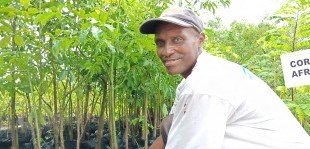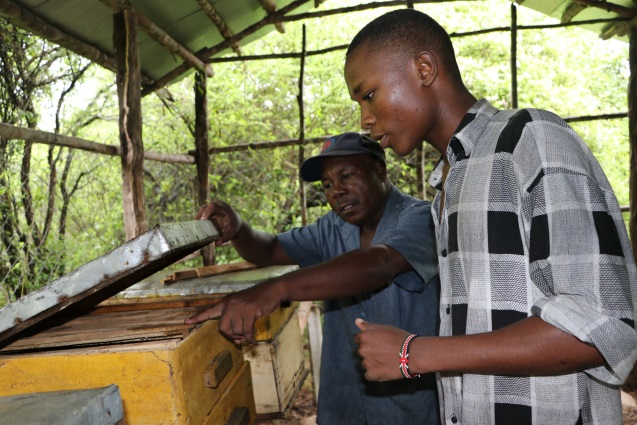Species protection - Three Kenyan success stories

WWF Kenya shares with us some of their success stories emanating from the IKI project on Coastal Forests in Kenya.
Story 1: Reaping the fruits of forest conservation by Samuel Benzi Karisa
Conservation pays. But it takes patience hard work and commitment. I am a member of Gogoni Forest Group; we started off back in 1997. Originally, we were a total of 52 members. Two decades later, only seven remain. Despite this, our individual resolve to protect our environment and bequeath our next generation a healthy forest cover is strengthened every day. There is no doubt that most of our members abandoned the mission of the forest conservation group simply because their expectations of a quick sell of tree seedlings were never met. They grew impatient and opted out.
Our Journey to Success
Initially we concentrated on growing the normal exotic tree species of casuarina, neem and eucalyptus. We quickly realized that these seedlings would not help us break even. We were selling a mature seedling of the exotic species at a paltry amount of between 3-5 Kenyan Shillings (Ksh) (approximately USD 0.03 - 0.05). It would take thousands of seedlings for us to make profit. Lack of demand for the tree species compounded our problems. Our turning point was in mid-2000, when an organization donated seedlings bags, tents and implements. We jointly decided to concentrate all our resources on growing indigenous tree species whose ecosystem services were much better, with the hope that we would earn more by selling the tree seedlings.
Naturally, indigenous tree species take much longer in the nursery beds. They also have a low survival rate and intense maintenance. This was yet another test to the group. Triggering another exodus from the group yet again. Additionally, finding market for our new products was tough. A few times we got to sell the seedlings at Ksh. 200-300 (approximately USD 2.00 - 3.00) which is 100 times the price of exotic species.
The Wind Fall
The tide finally turned in our favor after the start of the forest restoration programme within Kwale county by WWF-Kenya supported by IKI-BMU in early 2019. Our patience finally paid off. Our group joyfully received a request to supply 3,500 indigenous tree seedlings towards the restoration of Gogoni Forest Block. This I must say was life changing. In the life of the project, we had never imagined selling such a huge number of tree seedlings at once. The timing was perfect as wee had all the mature seedlings the project had requested from us. Andfinally, westarted to reap the fruits of our conservation work.
We banked a huge chunk of the money received to plan adequately on how best to expand our project. The remainder of the money was divided equally among all the members. The 7 members are now adequately economically empowered to comfortably pay school fees for their children, provide medical care and put food on the table.
Samuel Benzi Karisa is a founding member and the current secretary of Gogoni Forest Conservation Group who are one of the key beneficiaries of the Public-Private-People Partnerships Project to save Coastal Kenya Forests.
Story 2: The woman who never gave up on Gogoni forest by Mbuche Martin Nyamawe

Twice every week I visit our tree nursery bed at Gogoni without fail. I have been doing this for 22 years now. I am a member of the Gogoni Forest Conservation group. I am and will forever be grateful to this group for the knowledge I have gained and the benefits I have experienced. When Ijoined the group during its inception in 1997, I did not have any experience in tree nursery establishment and care. The support and training that I have gained over time is invaluable. I can now comfortably nature a seed to its maturity.
I am a widow and unemployed, putting food on the table and educating my children is tough. Apart from the odd jobs I take up in addition to subsistence farming, I have always banked on the success of our forest conservation group. At the beginning of the project, just like my other colleagues, I had thought of quitting the group. There was no substantial sale of the tree seedlings up until we switched gears to indigenous seedlings. Our fortunes are however, slowly and steadily changingOur Biggest breakthrough has been this year - 2019. For the first time in the history of our forest group, we got to sell more than three thousand tree seedlings at once.
I used part of the money I received to pay school fees for my children. I am happy this is happening now because one of my sons will start his higher education in the year 2020. There is no doubt about the value of trees. Trees provide us with edible healthy fruits. In addition, they clean the air we breathe and also prevent soil erosion. I shall endeavor to plant and grow as many trees as I can as well as spread the message of tree growing to my children and everyone.
Mbuche Martin Nyamawe is a founding member of Gogoni Forest Conservation Group
Story 3: Trees bringing back the buzz in Marenje community forest
As a young man growing up next to the forest, I loved to accompany my dad to the forest where he kept several traditional log beehives. It was fun. I always looked forward to the nature walk amidst the pristine majestic forest. Back then honey was part of dowry payment. We had such a respectful and mutually beneficial relationship with the Marenje Community Forest.
 When I retired from civil service almost 15 years ago, I embarked on a journey. I decided to carry my late father's legacy and began to transform myself and my community through beekeeping. While many people only appreciate bees for the honey they give freely, there is a crucial thing we forget - bees are pollinators and very critical organisms in our lives. Bees give us our food, put quite literally. But they depend heavily on forests and forested areas to pick up their nectar and thrive. Having a healthy forest is equivalent to having healthy bees and in return humans get to have food in plenty.
When I retired from civil service almost 15 years ago, I embarked on a journey. I decided to carry my late father's legacy and began to transform myself and my community through beekeeping. While many people only appreciate bees for the honey they give freely, there is a crucial thing we forget - bees are pollinators and very critical organisms in our lives. Bees give us our food, put quite literally. But they depend heavily on forests and forested areas to pick up their nectar and thrive. Having a healthy forest is equivalent to having healthy bees and in return humans get to have food in plenty.
With our forests gone, then the bees easily relocate. We, residents of Marenje will be the biggest losers. Through the training and learning by WWF-Kenya we have endeavored to integrate beekeeping business with forest conservation. The portion of my piece of land where I have set aside for beekeeping is forested.
I implore upon my son to embrace all these aspects of conservation agriculture by training him and mentoring him. Beekeeping is a more technical craft with limited labour. I encourage my fellow community members to embrace it as its returns are equally sweet.
I have also established wood lots within my farm in order not to interfere with the integrity of our community forest. This ensures that I have wood fuel throughout the year and get to sell the surplus. I am currently on a mission to encourage my community members to constantly plant trees especially during rainy seasons not just in the nearby forests but also on their farms with an aim of environmental conservation and for domestic purposes. The message to my community members is our forests are no longer a source of firewood, but rather for rendering ecosystem services.
Simeon Mwanyumba is a beekeeper living next to Marenje Community Forest. He is a member of Msambweni Beekeepers Association who are partners with WWF-Kenya in the implementation of the Public-Private-People Partnerships Project to save Coastal Kenya Forests.
The link has been copied to the clipboard
Contact
IKI Office
Zukunft – Umwelt – Gesellschaft (ZUG) gGmbH
Stresemannstraße 69-71
10963 Berlin



